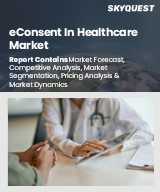
|
시장보고서
상품코드
1454043
헬스케어용 EConsent 시장 예측(-2030년) : 플랫폼, 등록 유형, 폼 유형, 용도, 최종사용자, 지역별 세계 분석EConsent in Healthcare Market Forecasts to 2030 - Global Analysis By Platform (Web-Based and Cloud-Based), Enrollment Type, Form Type, Application, End User and By Geography |
||||||
Stratistics MRC에 따르면 세계의 헬스케어용 EConsent 시장은 2023년에 4억 3,210만 달러를 차지하고 2030년에는 10억 3,560만 달러에 달할 것으로 예측되며, 예측 기간 중 CAGR은 13.3%입니다.
헬스케어용 EConsent는 디지털 플랫폼이나 전자 시스템을 통해 환자가 의료 행위나 시술, 연구 참여에 대한 사전 동의를 제공하는 전자적 프로세스를 말합니다. 전자 서명, 온라인 양식, 디지털 문서를 통해 환자의 동의 의사를 안전하게 획득하고 저장할 수 있습니다. 동의 절차를 간소화하고 환자와 의료 서비스 프로바이더 모두에게 보다 효율적이고 쉽게 이용할 수 있도록 하는 것을 목표로 합니다. 이를 통해 환자는 전자 동의를 하기 전에 치료 옵션, 위험, 혜택 및 대안에 대한 정보를 온라인에서 자신의 속도에 맞게 확인할 수 있습니다.
Signant Health의 'State of eConsent 2020' 보고서에 따르면 응답자의 28%가 eConsent를 EDC 제품 및 임상시험 관리 시스템과 통합하고 있으며, 17%, 19%, 26%는 각각 무작위 배정, 임상시험 의약품 공급 관리, 임상시험 마스터 파일, 임상시험 결과 평가 솔루션과 통합하고 있습니다. 솔루션, 전자 임상시험 마스터 파일, 전자 임상 결과 평가와 통합하고 있습니다.
전자의무기록(EHR) 도입 증가
헬스케어 업계에서 전자 의료 기록(EHR)의 도입이 급증하고 있으며, 특히 전자 동의(eConsent) 분야에서 두드러지게 나타나고 있습니다. 이러한 통합은 동의 프로세스를 간소화하고 환자가 의료 의사결정을 관리하는 데 있으며, 더 높은 접근성과 투명성을 제공합니다. 이러한 디지털 동의로의 전환은 효율성을 높일 뿐만 아니라 환자 참여를 강화하는 동시에 규제 표준을 준수할 수 있도록 보장합니다. 그 결과, 이 시장은 기술 보급에 힘입어 크게 성장하고 있습니다.
데이터 보안 및 개인정보 보호에 대한 우려
환자의 기밀 정보가 디지털화되어 전자적으로 공유됨에 따라 개인 의료 데이터의 무단 액세스, 데이터 유출 및 악용 가능성이 우려되고 있습니다. 강력한 암호화 프로토콜, 엄격한 액세스 제어, 엄격한 개인정보 보호 규정 준수를 보장하는 것이 필수적입니다. 불충분한 암호화 조치와 사이버 위협에 대한 불충분한 안전장비는 큰 문제가 되고 있습니다.
디지털 헬스 분야로 확대되는 디지털 헬스 활동
헬스케어 분야에서는 디지털 헬스, 특히 전자 동의 솔루션의 통합이 크게 확대되고 있습니다. 모바일 앱이나 웹 기반 포털과 같은 디지털 플랫폼을 활용하면 환자가 원격으로 편리하게 동의서에 접근, 확인 및 서명할 수 있습니다. 이는 효율성을 향상시킬 뿐만 아니라 규제 요건을 준수하고, 의료 관련 의사결정 과정에서 환자의 참여와 권한 부여를 촉진하는 데 도움이 됩니다.
초기 도입 비용
시장에서의 초기 도입 비용은 헬스케어 조직의 규모, 시스템의 복잡성, 필요한 커스터마이징 수준 등의 요인에 따라 달라질 수 있습니다. 소프트웨어 라이선스, 하드웨어 인프라, 직원 교육, 기존 시스템과의 통합, 규제 표준 준수 등과 관련된 비용이 포함됩니다. 따라서 이러한 요인들이 시장 성장을 저해하는 요인으로 작용하고 있습니다.
COVID-19의 영향 :
COVID-19 팬데믹은 헬스케어용 EConsent 시장에 큰 영향을 미치고 있습니다. 사회적 거리두기와 물리적 접촉을 최소화해야 하는 상황에서 의료 서비스 프로바이더들은 원격으로 환자와 쉽게 소통할 수 있는 전자 동의 솔루션의 채택을 늘리고 있습니다. 이러한 변화는 의료 분야의 디지털 혁신을 가속화하고 치료, 시술 및 임상시험에 대한 환자 동의를 얻기 위해 eConsent 플랫폼의 채택을 확대하는 결과를 가져왔습니다. 팬데믹은 효율적이고 안전하며 접근 가능한 동의 프로세스의 중요성을 강조하며 헬스케어 분야의 eConsent 시장 성장을 가속하고 있습니다.
예측 기간 중 일반 동의 부문이 가장 큰 비중을 차지할 것으로 예상됩니다.
예측 기간 중 일반 동의 부문이 가장 큰 비중을 차지할 것으로 예상됩니다. 이러한 플랫폼에서 일반 동의는 일반적으로 일상적인 의료 활동, 치료 및 건강 정보 공개에 대한 환자의 광범위한 권한을 포함합니다. e동의 솔루션은 동의 프로세스를 디지털화함으로써 효율성과 정확성, 규정 준수를 높이는 동시에 환자가 자신의 치료에 대한 정보에 입각한 의사결정을 내릴 수 있도록 돕습니다.
예측 기간 중 가장 높은 CAGR을 기록할 것으로 예상되는 분야는 임상 트레일 부문입니다.
예측 기간 중 가장 높은 CAGR을 기록할 것으로 예상되는 부문은 임상 트레일 부문입니다. 이 디지털 접근 방식은 동의 프로세스를 간소화하고 참여자 이해도 향상, 원격 액세스, 실시간 추적 등의 이점을 제공합니다. 기술이 발전함에 따라 eConsent 시스템의 통합이 확대되고 참가자 모집 및 동의 프로세스의 효율성과 투명성을 향상시켜 임상시험의 전망을 혁신적으로 변화시킬 것으로 예상됩니다.
가장 큰 점유율을 차지하는 지역 :
예측 기간 중 북미가 가장 큰 시장 점유율을 차지할 것으로 예상됩니다. 더 높은 편의성과 접근성을 제공하는 eConsent 툴은 규제 표준을 준수하면서 환자의 참여와 이해를 높이는 동시에 규제 표준을 준수하도록 보장합니다. 전자 서명 및 양방향 멀티미디어와 같은 기능을 통해 이러한 솔루션은 투명성을 높이고 정보에 입각한 의사결정을 촉진하며, 궁극적으로 의료 전반에 걸쳐 효율성과 책임성을 향상시킵니다.
CAGR이 가장 높은 지역 :
아시아태평양은 예측 기간 중 가장 높은 CAGR을 기록할 것으로 예상되며, eConsent 솔루션은 접근성 향상, 환자 교육 강화, 동의 과정의 투명성 향상 등의 이점을 제공합니다. 의료 기관들은 환자 치료 개선, 업무 효율성 향상, 규제 준수에 있으며, 디지털 솔루션의 가치를 인식하고 있으며, 이 시장에서의 채택이 확대될 것으로 예상됩니다.
무료 커스터마이징 서비스
이 보고서를 구독하는 고객은 다음과 같은 무료 맞춤화 옵션 중 하나를 이용할 수 있습니다.
- 기업 개요
- 추가 시장 진출기업의 종합적인 프로파일링(최대 3개사)
- 주요 기업의 SWOT 분석(최대 3개사)
- 지역 세분화
- 고객의 관심에 따른 주요 국가별 시장 추정, 예측, CAGR(주: 타당성 확인에 따라 다름)
- 경쟁사 벤치마킹
- 제품 포트폴리오, 지역적 입지, 전략적 제휴를 기반으로 한 주요 기업 벤치마킹
목차
제1장 주요 요약
제2장 서문
- 개요
- 이해관계자
- 조사 범위
- 조사 방법
- 데이터 마이닝
- 데이터 분석
- 데이터 검증
- 조사 어프로치
- 조사 소스
- 1차 조사 소스
- 2차 조사 소스
- 전제조건
제3장 시장 동향 분석
- 서론
- 촉진요인
- 억제요인
- 기회
- 위협
- 용도 분석
- 최종사용자 분석
- 신흥 시장
- 신종 코로나바이러스 감염증(COVID-19)의 영향
제4장 Porter's Five Forces 분석
- 공급 기업의 교섭력
- 구매자의 교섭력
- 대체품의 위협
- 신규 진출업체의 위협
- 경쟁 기업간 경쟁 관계
제5장 헬스케어 시장에서 세계 E콘센트 : 플랫폼별
- 서론
- 웹 기반
- 클라우드 기반
제6장 세계의 헬스케어용 EConsent 시장 : 등록 유형별
- 서론
- 리모트
- 온사이트
제7장 세계의 헬스케어용 EConsent 시장 : 폼 유형별
- 서론
- 특정 동의를 수반하는 일반적 거부
- 일반적 동의
- 일반적 거부
- 특정 거부를 포함한 일반적 동의
- 기타
제8장 세계의 헬스케어용 EConsent 시장 : 용도별
- 서론
- 헬스케어 시술
- 데이터 공유와 건강 정보교환
- 원격 헬스케어와 원격 감시
- 임상시험
- 가전
- 기타
제9장 세계의 헬스케어용 EConsent 시장 : 최종사용자별
- 서론
- 연구기관
- 제약회사
- 병원과 클리닉
- 기타
제10장 세계의 헬스케어용 EConsent 시장 : 지역별
- 서론
- 북미
- 미국
- 캐나다
- 멕시코
- 유럽
- 독일
- 영국
- 이탈리아
- 프랑스
- 스페인
- 기타 유럽
- 아시아태평양
- 일본
- 중국
- 인도
- 호주
- 뉴질랜드
- 한국
- 기타 아시아태평양
- 남미
- 아르헨티나
- 브라질
- 칠레
- 기타 남미
- 중동 및 아프리카
- 사우디아라비아
- 아랍에미리트
- 카타르
- 남아프리카공화국
- 기타 중동 및 아프리카
제11장 주요 발전
- 계약, 파트너십, 협업, 합병사업
- 인수합병
- 신제품의 발매
- 사업 확대
- 기타 주요 전략
제12장 기업 개요
- Citadel Group
- Veeva Systems
- Thieme Compliance GmbH
- Wellbeing Software
- Interlace Health
- Florence Healthcare
- 5thPort, LLC
- Adobe Inc.
- Concentric Health Ltd
- GE Healthcare
- Koninklijke Philips N.V.
- HealthStream Inc.
- Cerner Corporation
- Medtronic
- Siemens Healthineers
- ClinOne
According to Stratistics MRC, the Global EConsent in Healthcare Market is accounted for $432.1 million in 2023 and is expected to reach $1035.6 million by 2030 growing at a CAGR of 13.3% during the forecast period. EConsent in healthcare refers to the electronic process through which patients provide their informed consent for medical treatment, procedures, or participation in research studies using digital platforms or electronic systems. It encompasses the use of electronic signatures, online forms, and digital documentation to capture and store patients' consent preferences securely. It aims to streamline the consent process, making it more efficient and accessible for both patients and healthcare providers. It allows patients to review information about their treatment options, risks, benefits, and alternatives online, at their own pace, before consenting electronically.
According to the State of eConsent 2020 report by Signant Health, 28% of survey respondents integrated eConsent with EDC products and clinical trial management systems, while 17%, 19%, and 26% integrated eConsent with randomization & trial supply management solutions, electronic trial master file, and electronic clinical outcome assessment, respectively.
Market Dynamics:
Driver:
Increased adoption of electronic health records (EHRs)
The healthcare industry is witnessing a surge in the adoption of electronic health records (EHRs), particularly in the realm of EConsent. The integration streamlines the consent process, offering patients greater accessibility and transparency in managing their healthcare decisions. This shift towards digital consent not only enhances efficiency but also ensures compliance with regulatory standards while bolstering patient engagement. As a result, the market is experiencing significant growth propelled by the widespread embrace of technology.
Restraint:
Concerns about data security and privacy
With sensitive patient information being digitized and shared electronically, there are worries about unauthorized access, data breaches, and potential misuse of personal health data. Ensuring robust encryption protocols, stringent access controls, and compliance with stringent privacy regulations is imperative. Insufficient encryption measures and inadequate safeguards against cyber threats pose significant challenges.
Opportunity:
Expansion of digital health initiatives
The healthcare sector has seen a significant expansion of digital health initiatives, particularly in the integration of electronic consent solutions. By leveraging digital platforms, such as mobile apps or web-based portals, patients can conveniently access, review, and sign consent forms remotely. This not only improves efficiency but also ensures compliance with regulatory requirements while promoting patient engagement and empowerment in their healthcare decision-making process.
Threat:
Initial implementation costs
The initial implementation costs in the market can vary depending on factors such as the size of the healthcare organization, the complexity of the system, and the level of customization required. They encompass expenses related to software licensing, hardware infrastructure, staff training, integration with existing systems, and compliance with regulatory standards. Hence, these are the factors hampering the growth of the market.
Covid-19 Impact:
The COVID-19 pandemic has significantly impacted the eConsent in healthcare market. With social distancing measures and the need to minimize physical contact, healthcare providers are increasingly adopting electronic consent solutions to facilitate remote patient interactions. This shift has accelerated the digital transformation in healthcare, leading to greater adoption of eConsent platforms for obtaining patient consent for treatments, procedures, and clinical trials. The pandemic has underscored the importance of efficient, secure, and accessible consent processes, driving the growth of the eConsent market in healthcare.
The general consent segment is expected to be the largest during the forecast period
The general consent segment is expected to be the largest during the forecast period. General consent within these platforms typically encompasses broad permissions granted by patients for routine healthcare activities, treatments, and disclosures of health information. By digitizing the consent process, eConsent solutions enhance efficiency, accuracy, and compliance while empowering patients to make informed decisions about their care.
The clinical trails segment is expected to have the highest CAGR during the forecast period
The clinical trails segment is expected to have the highest CAGR during the forecast period. This digital approach streamlines the consent process, offering benefits such as enhanced participant comprehension, remote access, and real-time tracking. As technology evolves, the integration of eConsent systems is anticipated to grow, revolutionizing the clinical trial landscape by enhancing efficiency and transparency in participant recruitment and consent processes.
Region with largest share:
North America is projected to hold the largest market share during the forecast period. Offering greater convenience and accessibility, eConsent tools enhance patient engagement and comprehension while ensuring compliance with regulatory standards. With features like electronic signatures and interactive multimedia, these solutions improve transparency and facilitate informed decision-making, ultimately fostering efficiency and accountability across the healthcare continuum.
Region with highest CAGR:
Asia Pacific is projected to hold the highest CAGR over the forecast period. Data security and privacy are paramount concerns in the adoption of eConsent solutions. eConsent solutions offer benefits such as improved accessibility, enhanced patient education, and greater transparency in the consent process. The adoption in the market is expected to continue growing as healthcare organizations recognize the value of digital solutions in improving patient care, enhancing operational efficiency, and ensuring regulatory compliance.
Key players in the market
Some of the key players in EConsent in Healthcare market include Citadel Group, Veeva Systems, Thieme Compliance GmbH, Wellbeing Software, Interlace Health, Florence Healthcare, 5thPort, LLC, Adobe Inc., Concentric Health Ltd, GE Healthcare, Koninklijke Philips N.V., HealthStream Inc., Cerner Corporation, Medtronic, Siemens Healthineers and ClinOne.
Key Developments:
In June 2022, uMotif and ClinOne announced a partnership to address the challenges faced by patients & clinical research coordinators who struggle to navigate multiple systems, apps, & sensors for each protocol.
In October 2020, Veeva Systems launched two new applications built on Veeva Clinical Network - Veeva Site Connect and Veeva eConsent.
Platforms Covered:
- Web-Based
- Cloud-Based
Enrollment Types Covered:
- Remote
- On-Site
Form Types Covered:
- General Denial with Specific Consent(s)
- General Consent
- General Denial
- General Consent with Specific Denial(s)
- Other Form Types
Applications Covered:
- Medical Procedures
- Data Sharing and Health Information Exchange
- Telehealth and Remote Monitoring
- Clinical Trails
- Consumer Electronics
- Other Applications
End Users Covered:
- Research Organizations
- Pharmaceutical Companies
- Hospitals & Clinics
- Other End Users
Regions Covered:
- North America
- US
- Canada
- Mexico
- Europe
- Germany
- UK
- Italy
- France
- Spain
- Rest of Europe
- Asia Pacific
- Japan
- China
- India
- Australia
- New Zealand
- South Korea
- Rest of Asia Pacific
- South America
- Argentina
- Brazil
- Chile
- Rest of South America
- Middle East & Africa
- Saudi Arabia
- UAE
- Qatar
- South Africa
- Rest of Middle East & Africa
What our report offers:
- Market share assessments for the regional and country-level segments
- Strategic recommendations for the new entrants
- Covers Market data for the years 2021, 2022, 2023, 2026, and 2030
- Market Trends (Drivers, Constraints, Opportunities, Threats, Challenges, Investment Opportunities, and recommendations)
- Strategic recommendations in key business segments based on the market estimations
- Competitive landscaping mapping the key common trends
- Company profiling with detailed strategies, financials, and recent developments
- Supply chain trends mapping the latest technological advancements
Free Customization Offerings:
All the customers of this report will be entitled to receive one of the following free customization options:
- Company Profiling
- Comprehensive profiling of additional market players (up to 3)
- SWOT Analysis of key players (up to 3)
- Regional Segmentation
- Market estimations, Forecasts and CAGR of any prominent country as per the client's interest (Note: Depends on feasibility check)
- Competitive Benchmarking
- Benchmarking of key players based on product portfolio, geographical presence, and strategic alliances
Table of Contents
1 Executive Summary
2 Preface
- 2.1 Abstract
- 2.2 Stake Holders
- 2.3 Research Scope
- 2.4 Research Methodology
- 2.4.1 Data Mining
- 2.4.2 Data Analysis
- 2.4.3 Data Validation
- 2.4.4 Research Approach
- 2.5 Research Sources
- 2.5.1 Primary Research Sources
- 2.5.2 Secondary Research Sources
- 2.5.3 Assumptions
3 Market Trend Analysis
- 3.1 Introduction
- 3.2 Drivers
- 3.3 Restraints
- 3.4 Opportunities
- 3.5 Threats
- 3.6 Application Analysis
- 3.7 End User Analysis
- 3.8 Emerging Markets
- 3.9 Impact of Covid-19
4 Porters Five Force Analysis
- 4.1 Bargaining power of suppliers
- 4.2 Bargaining power of buyers
- 4.3 Threat of substitutes
- 4.4 Threat of new entrants
- 4.5 Competitive rivalry
5 Global EConsent in Healthcare Market, By Platform
- 5.1 Introduction
- 5.2 Web-Based
- 5.3 Cloud-Based
6 Global EConsent in Healthcare Market, By Enrollment Type
- 6.1 Introduction
- 6.2 Remote
- 6.3 On-Site
7 Global EConsent in Healthcare Market, By Form Type
- 7.1 Introduction
- 7.2 General Denial with Specific Consent(s)
- 7.3 General Consent
- 7.4 General Denial
- 7.5 General Consent with Specific Denial(s)
- 7.6 Other Form Types
8 Global EConsent in Healthcare Market, By Application
- 8.1 Introduction
- 8.2 Medical Procedures
- 8.3 Data Sharing and Health Information Exchange
- 8.4 Telehealth and Remote Monitoring
- 8.5 Clinical Trails
- 8.6 Consumer Electronics
- 8.7 Other Applications
9 Global EConsent in Healthcare Market, By End User
- 9.1 Introduction
- 9.2 Research Organizations
- 9.3 Pharmaceutical Companies
- 9.4 Hospitals & Clinics
- 9.5 Other End Users
10 Global EConsent in Healthcare Market, By Geography
- 10.1 Introduction
- 10.2 North America
- 10.2.1 US
- 10.2.2 Canada
- 10.2.3 Mexico
- 10.3 Europe
- 10.3.1 Germany
- 10.3.2 UK
- 10.3.3 Italy
- 10.3.4 France
- 10.3.5 Spain
- 10.3.6 Rest of Europe
- 10.4 Asia Pacific
- 10.4.1 Japan
- 10.4.2 China
- 10.4.3 India
- 10.4.4 Australia
- 10.4.5 New Zealand
- 10.4.6 South Korea
- 10.4.7 Rest of Asia Pacific
- 10.5 South America
- 10.5.1 Argentina
- 10.5.2 Brazil
- 10.5.3 Chile
- 10.5.4 Rest of South America
- 10.6 Middle East & Africa
- 10.6.1 Saudi Arabia
- 10.6.2 UAE
- 10.6.3 Qatar
- 10.6.4 South Africa
- 10.6.5 Rest of Middle East & Africa
11 Key Developments
- 11.1 Agreements, Partnerships, Collaborations and Joint Ventures
- 11.2 Acquisitions & Mergers
- 11.3 New Product Launch
- 11.4 Expansions
- 11.5 Other Key Strategies
12 Company Profiling
- 12.1 Citadel Group
- 12.2 Veeva Systems
- 12.3 Thieme Compliance GmbH
- 12.4 Wellbeing Software
- 12.5 Interlace Health
- 12.6 Florence Healthcare
- 12.7 5thPort, LLC
- 12.8 Adobe Inc.
- 12.9 Concentric Health Ltd
- 12.10 GE Healthcare
- 12.11 Koninklijke Philips N.V.
- 12.12 HealthStream Inc.
- 12.13 Cerner Corporation
- 12.14 Medtronic
- 12.15 Siemens Healthineers
- 12.16 ClinOne



















